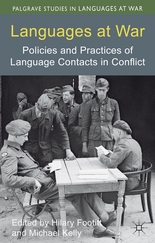 Language is an issue in almost every aspect of conflict: in training and preparation for action, in intelligence work, in talking to people on the ground and in different military units communicating with each other. I studied the UN and NATO actions in Bosnia-Herzegovina in the 1990s, when Yugoslavia was breaking up in a messy succession of regional and ethnic conflicts. It started as a peacekeeping operation and ended as a large scale rebuilding of the country. Winning hearts and minds was at the centre of the operations, and you can’t do that if you can’t communicate.
Language is an issue in almost every aspect of conflict: in training and preparation for action, in intelligence work, in talking to people on the ground and in different military units communicating with each other. I studied the UN and NATO actions in Bosnia-Herzegovina in the 1990s, when Yugoslavia was breaking up in a messy succession of regional and ethnic conflicts. It started as a peacekeeping operation and ended as a large scale rebuilding of the country. Winning hearts and minds was at the centre of the operations, and you can’t do that if you can’t communicate.
The military need at least some personnel to have a good knowledge of the local languages, but that is a big commitment for individuals and a big investment by the forces, who in practice will only ever be able to train a small number of specialists. Of course, they need a larger number of officers and troops who are able to communicate at a basic level. We also discovered that multinational forces are now the norm, and they work in a multilingual environment, even where there is a lingua franca such as international English.
Usually, the military rely heavily on local people to act as intermediaries, interpreting and translating for them. But it is often a difficult relationship, when the military don’t know how much to trust the people they employ locally, and the local interpreters don’t know how they will be regarded by their own people.
We interviewed more than 50 people who had been involved in the Bosnia operation, military and civilians. We were wowed by their stories and collected a lot of lessons that need to be learned. We are feeding these back, and we are also discovering that it is not easy to transfer the lessons from one conflict to another. But we have succeeded in putting language issues on the radar for military planners, and for the Imperial War Museum. And we have sparked more researchers to study languages in conflict.
http://www.southampton.ac.uk/ml/about/staff/mhk.page?
Useful links:
Details of the Languages at War project undertaken by the teams at Southampton and Reading with the Imperial War Museum.

 Details of a new book series on Languages at War, published by Palgrave Macmillan.
Details of a new book series on Languages at War, published by Palgrave Macmillan.